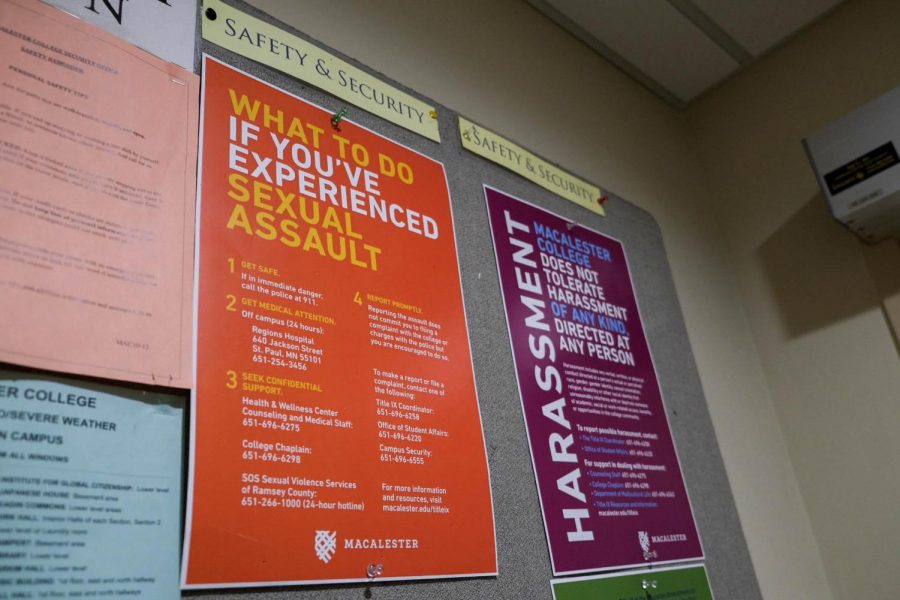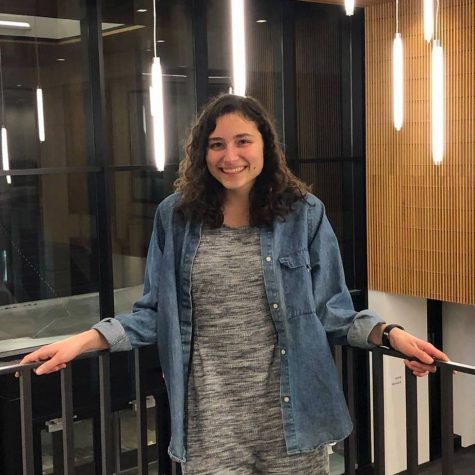Title IX changes take effect at Macalester
September 10, 2020
Please be advised: This article contains discussion of the Title IX office and Title IX process, sexual harassment, sexual violence and gender- and sex-based discrimination.
On May 6, the Department of Education under Betsy DeVos released new regulations limiting the scope of Title IX policy as it applies to colleges and universities. When the new guidance went into effect on August 14, Macalester uploaded the newest iteration of their Title IX and Sexual Misconduct policy.
Since the announcement in May, Title IX and Bias Harassment Coordinator Regina Curran has worked with groups of students, staff and faculty to craft Macalester’s new regulations. The Title IX office emailed the update to the campus community on Sept. 3.
The new regulations outline two separate policies that both fall under the purview of the Title IX office, but that address different scopes of complaints. The Title IX sexual misconduct policy covers complaints that fall under the new federal definition of a Title IX violation; the non-Title IX sexual misconduct policy covers a wider scope of discrimination and misconduct complaints that may not qualify as violations of the new federal Title IX policy.
Curran said that this two-track system arose from concerns over how much the new federal guidelines narrowed the definition of what constitutes a violation of Title IX policy.
“They sort of limited the scope of Title IX,” Curran said. “They said very clearly in the regulations, schools could continue to have policies to protect students in those other areas, they just can’t call it Title IX, and so what we elected to do is call it sexual misconduct.”
For a complaint to go down the new Title IX sexual misconduct path, the complaint would need to fit the new federal definition of sexual harassment: behavior that is “severe, pervasive and objectively offensive.” This narrows the scope from the previous federal policy, which defined harassment as “severe, pervasive or objectively offensive.”
That tightened definition essentially raises the bar of what constitutes sexual harassment, making it more difficult for survivors to bring a case forward and more likely that perpetrators will be found not responsible.
Complaints falling under the Title IX sexual misconduct policy need to fit the narrowed federal jurisdiction of Title IX, too; Title IX offices in schools are now only required to investigate complaints that occur on campus or at school-sanctioned events in the United States, leaving out any misconduct in off-campus homes or on study away programs.
Because of these changes, complaints that don’t fit that jurisdiction and scope — for example, anything that happens off-campus or that doesn’t rise to the level of “severe, pervasive and objectively offensive” — will go down the non-Title IX sexual harassment track at Macalester.
Curran will still manage non-Title IX track cases, and the same pool of Macalester staff will serve as adjudicators.
The first step on the two tracks — the investigation — remains the same for both Title IX and non-Title IX sexual misconduct cases. On both tracks, the Title IX office has 45 days for its initial investigation of the complaint.
From there, complaints that fall under the non-Title IX sexual harassment policy will generally follow the format of Macalester’s previous process for investigations and resolution: a period of time for parties and their advisers to review and respond to all evidence in writing, adjudication and the option to appeal the final decision.
Complaints that do fit under the new federal definition — cases that will follow Macalester’s Title IX sexual harassment track — must follow a different process per the federal guidelines.
One of the controversial steps required by the new guidelines is a live hearing with a cross-examination between the complainant and the respondent, in which advisors for each party will ask the other questions.
Macalester does have some say over how to conduct those hearings. Curran noted two specific areas where the federal policy leaves room for schools to shape their own procedures: filtering questions and enforcing rules of decorum.
“For some, a live hearing will never be something that they view as accessible for them, so I understand that, but we’re going to do the best we can with what we have,” Curran said.
Macalester’s new policy specifies that parties need to submit their questions to the hearing officers in writing before asking them out loud. Curran believes that filtering questions can help keep advisers from trying to “steamroll” parties with rapid, repetitive or antagonistic questions.
Hearing officers will enforce rules of decorum during hearings, as well.
“We’re not going to allow parties or advisers to be abusive to each other in this space,” Curran said. “If we need to take a break and reschedule [hearings] we will absolutely do that, but I do think that’s an important component of making sure that they are as accessible as possible.”
Curran also said that she plans to hold live hearings only via video conferences, though the college does reserve the right to hold in-person hearings, as outlined in its new policy.
One major change to both tracks is a shift in the timeline for the Title IX reporting and resolution process. The college’s previous policy stated that the Title IX office would conclude the response and resolution process in 60 days, not including the appeal — although Curran noted that the office rarely met its own timeline.
Now the timeline for Title IX sexual harassment allows for at least 97 days, or 112 days with an appeal. The non-Title IX sexual harassment track allows for at least 85 days, or 100 with an appeal.
“Folks were in agreement that, at the end of the day, if we couldn’t guarantee a shorter timeline, we’d rather guarantee some level of transparency and honesty… so that you can plan accurately,” Curran said. “And of course, if we can finish it faster, we’re going to finish it faster.”
Macalester’s new policy also notes the possibility for informal resolution — a separate path from either the Title IX or non-Title IX sexual harassment policies. The Title IX office can facilitate informal processes if both the complainant and the respondent volunteer for it. However, allegations of sexual harassment against an employee from a student must follow the formal process.
The new federal guidelines opened the door for this option, as long as schools do not pressure parties to enter that process instead of a formal investigation.
Macalester’s policy does not outline exactly what informal resolution might look like. Curran said that she intentionally left this open-ended.
“We decided… to leave it as broad as possible to give folks the widest array of options for when I work with them,” Curran said. “It could absolutely be structured and be tailored to look like a variety of things.”
Curran named a few options for informal resolution — it might work as a “shuttle negotiation,” in which the complainant and the respondent meet with their advisers in separate rooms and send written statements and requests back and forth.
Mediation, a dialogue between the two parties facilitated by a trained and experienced mediator, could be another option. Mediation is another controversial method of resolution that the old federal policy discouraged out of a concern that schools could use it to sweep cases of misconduct under the rug without reporting the incidents or issuing sanctions.
Curran also said that the working groups brought up the possibility of incorporating restorative justice methods. While this is not entirely off the table, Curran said the Title IX office would need a trained facilitator before attempting a restorative justice process.
While the new policy does not list any specific sanctions that might come out of informal processes, Curran said they could be the same as those that come out of formal investigations. This is a shift from Macalester’s previous policy, which offered an informal process that could not result in sanctions.
The new federal guidelines also allowed schools to choose between two different standards of evidence in Title IX cases: preponderance of the evidence or clear and convincing evidence. Previous federal guidance discouraged the clear and convincing standard, which requires more proof in order to find a respondent responsible.
Macalester decided to continue to use the preponderance of evidence standard across all cases, as it did under its previous policy.
The new policy also creates a new category of “semi-confidential” employees, who are not required to report anything a student discloses to the Title IX office. This category includes all Laurie Hamre Health & Wellness Center employees not covered under state confidentiality laws (such as Health Promotion staff) and Mac EMT students when they are on call.
All other employees are still required to report concerns to the Title IX Coordinator.
Curran plans to maintain this new policy through the end of this school year, but she anticipates revisiting it and possibly making changes next summer. In early spring of 2021, she will start hosting discussions to hear from the community about what’s working and what isn’t.
For now, with students dispersed between campus and their homes, Curran said she hopes students find resources they might need. And she hopes that her office can be one of those resources, despite the new changes and this unusual semester.
Resources
Off-Campus Reporting (MN):
- Police: 911 (24-Hour Emergency)
- Regions Hospital Emergency Center: 651-254-3456
- Sexual Assault Nurse Examiners (SANE) Hennepin County Medical Center Emergency Room: 612-873-3000
- Sexual Assault Resources Service: 612-873-5832
On-Campus Reporting
- Office of Title IX and Bias Harassment: [email protected] OR 651-696-6258
- Online Reporting Form: This anonymous online reporting form is available through the hyperlink and on Macalester’s Sexual Violence Prevention Education webpage.
- Campus Security: 651-696-6555 (24-Hour Emergency)
- Dean of Students DeMethra LaSha Bradley: 651-696-6220 OR [email protected]
- Head Softball Coach/Senior Woman Administrator Jody Gabriel: 651-696-6157 OR [email protected]
- Associate Dean of Students Andrew Wells: 651-696-6220 OR [email protected]
- Director of the Center for Study Away Kevin Morrison: 651-696-6077 OR [email protected]
Confidential Off-Campus Resources:
- SOS Sexual Violence Services of Ramsey County 24-hour hotline: 651-266-1000
- RAINN (Rape, Assault & Incest National Network) 24-hour hotline: 1-800-656-HOPE
- Sexual Violence Center Minneapolis 24-hour hotline: 612-871-5111
- Trevor Project hotline (focused on LGBTQ+ youth): 1-866-488-7386
Confidential Campus Resources:
- Associate Dean and Chaplain Kelly Stone: 651-696-6298 OR [email protected]
- Press 2: 651-696-6275 (Press 2 is available 24/7 from anywhere in the world)
- Mental health counselors at the Macalester Health and Wellness Center
Online Resources:
- Love is Respect Safe Horizon Minnesota Women’s Consortium
- Know Your IX (Information on Title IX, how to support survivors as family, friends or professors)















